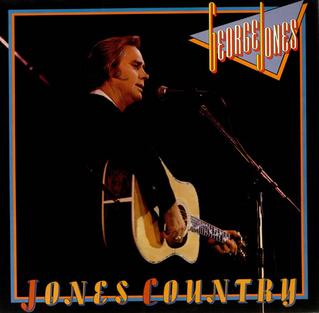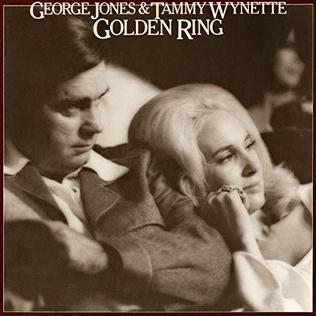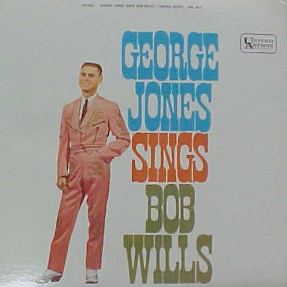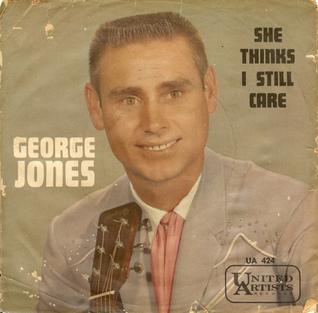
George Glenn Jones was an American musician, singer, and songwriter. He achieved international fame for his long list of hit records, including his best-known song "He Stopped Loving Her Today", as well as his distinctive voice and phrasing. For the last two decades of his life, Jones was frequently referred to as the greatest living country singer. Country music scholar Bill Malone writes, "For the two or three minutes consumed by a song, Jones immerses himself so completely in its lyrics, and in the mood it conveys, that the listener can scarcely avoid becoming similarly involved." Waylon Jennings expressed a similar opinion in his song "It's Alright": "If we all could sound like we wanted to, we'd all sound like George Jones." The shape of his nose and facial features earned Jones the nickname "The Possum". George Jones has been called "The Rolls Royce Of Country Music" and had more than 160 chart singles to his name from 1955 until his death in 2013.

Cold Hard Truth is the 56th studio album by American country music singer George Jones. The album was released on June 22, 1999 on the Asylum label.

I Am What I Am is an album by American country music artist George Jones released in 1980 on Epic Records label. On July 4, 2000, the CD version was reissued with four previously unreleased bonus tracks on the Legacy Recordings label.

One Woman Man is an album by American country music artist George Jones, released on February 28, 1989 on Epic Records.

The Gospel Collection is the 58th studio album by American country music singer George Jones, released on April 4, 2003 on the Bandit Records label.

Wine Colored Roses is an album by American country music artist George Jones released in 1986 on the Epic Records label. It peaked at number 5 on the Billboard Country Albums chart. Wine Colored Roses went Gold in 1994.

Ladies' Choice is an album by American country music artist George Jones, released in 1984 on the Epic Records label. It was composed largely of duets with female artists.

Jones Country is an album by American country music artist George Jones released in 1983 on the Epic Records label.

My Very Special Guests is a duet album by American country music artist George Jones released in 1979 on the Epic Records label.

Golden Ring is the seventh studio album by American country music artists George Jones and Tammy Wynette, released in August 1976 on the Epic Records label. It reached No. 1 on the Billboard Country Album chart. The singles "Near You" and "Golden Ring" both reached No. 1 on the Country Singles chart.

George Jones Sings Bob Wills is an album by American country music artist George Jones. It was released in 1962 on the United Artists Records.

Yesterday's Wine is the thirteenth studio album and a concept album by country singer Willie Nelson. Nelson had been recording for RCA Victor since the early 1960s, and had no significant hits. By 1970, his recordings had reached mid-chart positions. Nelson lost the money from his song-writing royalties by financing unsuccessful concert tours that were generally unprofitable. In addition to problems with his music career, Nelson had problems in his personal life. He had divorced his wife, Shirley Collie, and his Tennessee ranch had been destroyed by a fire.

"She Thinks I Still Care" is a country song written by Dickey Lee and Steve Duffy. The song was recorded by multiple artists, including George Jones, Connie Francis, Anne Murray, Elvis Presley and Patty Loveless.
Arthur Leo "Doodle" Owens was an American country music songwriter and singer. He had a long songwriting partnership with Dallas Frazier, with whom he wrote "All I Have to Offer You " (1969), "(I'm So) Afraid of Losing You Again" (1969), "I Can't Believe That You've Stopped Loving Me" (1970) and "Then Who Am I" (1974), all number-one country hits for Charlie Pride. In the 1980s, Owens wrote many songs with fellow songwriter Dennis Knutson for George Jones and other artists.
"C.C. Waterback" is a song recorded by American country music artists Merle Haggard and George Jones. It was released in December 1982 as the second single from the album A Taste of Yesterday's Wine. The song reached #10 on the Billboard Hot Country Singles & Tracks chart. The song was written by Haggard.
"Hopelessly Yours" is a song written by Keith Whitley, Curly Putman, and Don Cook. Whitley recorded a demo that was never officially released. The first release was by George Jones on his 1986 album Wine Colored Roses.
"The Right Left Hand" is a song written by Dennis Knutson and A.L. "Doodle" Owens, and recorded by American country music artist George Jones. It was released in January 1987 as the second single from his album Wine Colored Roses. The song peaked at number 8 on the Billboard Hot Country Singles chart. The song is about marriage; the narrator rejoices at putting "a golden band on the right left hand" after several failed marriages. Many interpreted the song as George's tribute to his fourth wife Nancy, whom he credited with saving his life and career. Jones would not see the Top 10 again until late 1988.
"Somebody Wants Me Out of the Way" is a song written by Dennis Knutson and A.L. "Doodle" Owens and recorded by American country music artist George Jones. It was released in April 1986 as the third single from his album Who's Gonna Fill Their Shoes. The song peaked at number 9 on the Billboard Hot Country Singles chart. The song is very much in the tradition of George's previous hits "Still Doin' Time" and "If Drinkin' Don't Kill Me " in that it is a hard "drinking song," but it's also a "cheatin'" song, with the narrator suspicious that "Somebody keeps paying my bar tab but the bartender won't tell me who." Jones delivers a soulful, bluesy vocal over a stone country arrangement with a prominent, shimmering acoustic guitar. The singer, who had been a notorious drinker, was sober by this time thanks to his wife Nancy, who had gotten his career back on track after years of mismanagement and missed concert dates.
"Just One More" is a 1956 country music song by American artist George Jones. It was released as a single on Starday Records in 1956 reached #3 on the Billboard country singles chart. The song is often featured on his early compilation albums and was one of the most successful of his self-penned songs.
"I Turn to You" is a love song by country music singer George Jones. It was composed by Max D. Barnes and Curly Putman. It was released by Epic Records as the third single from the album Wine Colored Roses in 1987. It heralded a downturn for the singer on the country charts, failing to make the Top 25, and reflected the changes taking place in country music at the time as the "new traditionalist" movement, with younger country artists like Randy Travis, dominating radio airplay.












